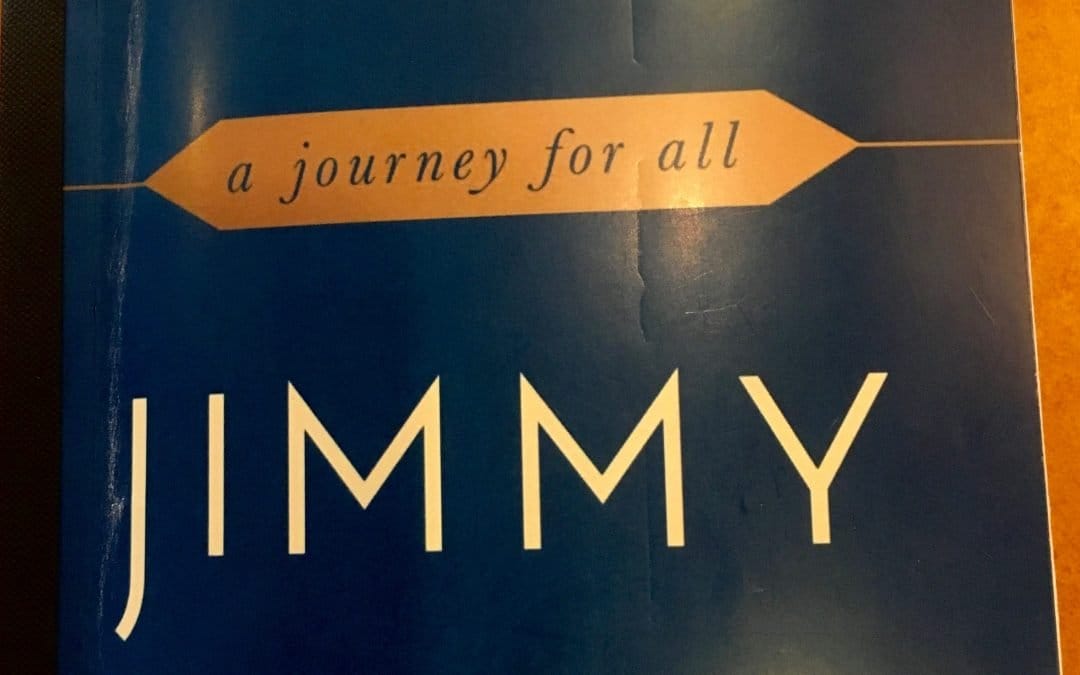Anyone who grew up in church where “testimony times” were frequent will feel at home reading Jimmy Carter’s latest book, Faith: A Journey for All (2018, Simon & Schuster).
Indeed the personal Christian testimony of the Baptist layman from rural southwest Georgia who became the 39th U.S. president reveals a life of growing faith and faithfulness over the past 93 years.
“Our faith should be a guide for us in deciding between the permanent and the transient, the important and the relatively insignificant, the gratifying and the troubling, the joyful and the depressing,” writes Carter.
Following the example of his Sunday school teaching father, the fresh-faced midshipman at the U.S. Naval Academy taught Bible lessons to the children whose parents were stationed there. And he’s never stopped studying and teaching from the holy texts he’s come to know well — and engages deeply throughout this book.
Times have changed, but the calling to explore, share and live out biblical truths remains the former president’s high priority — whether teaching a current gathering of worldwide guests snuggled into the pews of Maranatha Baptist Church in Plains, Ga., or in much earlier and different settings.
“I conducted religious services on special days, such as Christmas and Easter,” writes Carter of being a young Navy officer at sea. “A dozen or more of the submarine crew would sit on folding bunks between the torpedoes, and I would stand forward in the torpedo room close to the launching tubes to read the religious text, ask and answer questions and say a prayer.”
From those more-youthful days to an elder statesman, Carter has lived out his Baptist-shaped Christian faith in ways that God-fearing mamas pray their children will grow up to do.
The former president acknowledges theologians (the Niebuhrs, Bonhoeffer, Bultmann, Brunner, Barth, Moltmann, Kierkegaard and others) who influenced his faith formation, as well as friends and family.
He counters the public caricature of his late brother Billy who overcame alcohol addiction and assisted others with that challenge: “My brother was an inspiration to me.”
Carter recounted the time as governor of Georgia in the 1970s when Bob Dylan gave a concert in Atlanta, and afterward came to the governor’s mansion with his band.
“My three sons were very excited to spend time with the band, and I was pleased when Bob asked for a private discussion with me,” Carter recounted. “He and I went out into the garden, and for an hour or so I answered his questions about my Christian faith.”
Dylan, who was intently interested, noted Carter, announced later that he had embraced the Christian faith.
Carter’s long life as a faithful husband for more than 70 years and an active Christian layman who made church involvement and Bible teaching a high priority even during demanding times, a volunteer lay missionary who did door-to-door evangelism in Pennsylvania as part of Southern Baptists’ Bold Mission Thrust, one who continues serving the poor and suffering, and has shared his faith publicly and privately, again and again, is hailed by many.
Except, of course, by fundamentalist Christians who in the 1980s — after first rallying to defend racial discrimination at Bob Jones University — began to define their religion in terms of political opposition to equal rights for LGBTQ persons and equal access to medical abortion — issues unknown throughout most of Christian history.
Fundamentalism is characterized by “rigidity, domination and exclusion,” notes Carter. “In sharp contrast, Jesus espoused humility, servanthood of leaders, and breaking down walls between people.”
Though theologically conservative within the larger framework of Christianity, Carter’s rejection of this narrowly-defined politicized faith has brought more condemnation from fundamentalists than directed toward other politicians with scant to no faith commitments and practices but who promise to deliver preferred political goods.
Yet Carter stands firm in his faith — noting the challenges and losses in life when he has been sustained: “God is not my personal valet. God does not … keep me from trouble, fulfill my personal desires or guarantee my success. However, through prayer God offers me comfort, reassurance, satisfaction, courage, hope and peace.”
And it is clear that the examples from his upbringing — at home and church — greatly shaped such a firm foundation: “A commitment to my basic Christian faith was instilled in me in childhood,” he writes.
Well-bred Baptists will appreciate Carter’s telling about the sacredness of Sundays when his parents put away their playing cards, and any fishing required slipping down to the pond. And this story:
“At the age of 12, when I was deemed old enough to drive a car by myself, my sisters and I went back to the church on Sunday evenings for meetings of the Baptist Young People’s Union (BYPU).”
Carter’s Christocentric faith is conveyed throughout the book with such affirmations as: “For a Christian, the constant access to God and the life and teachings of Jesus offer a sound moral foundation that includes all the most basic ideals that should guide us.”
When asked to define Christianity, Carter notes: “My best explanation is that a Christian is a person professing Jesus Christ as personal savior, and striving to have the human qualities demonstrated by Jesus.”
If it’s been awhile since you sat through a good ol’ testimony time, pick up this book. And don’t be embarrassed if an “Amen” slips out now and then.
Director of the Jesus Worldview Initiative at Belmont University in Nashville, Tennessee and former executive editor and publisher at Good Faith Media.



